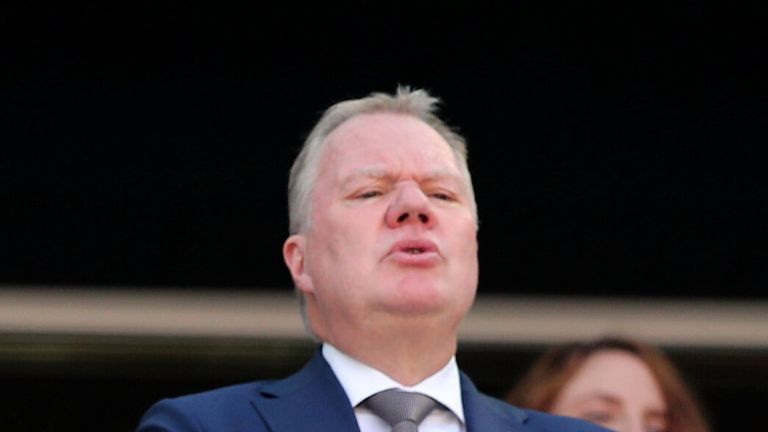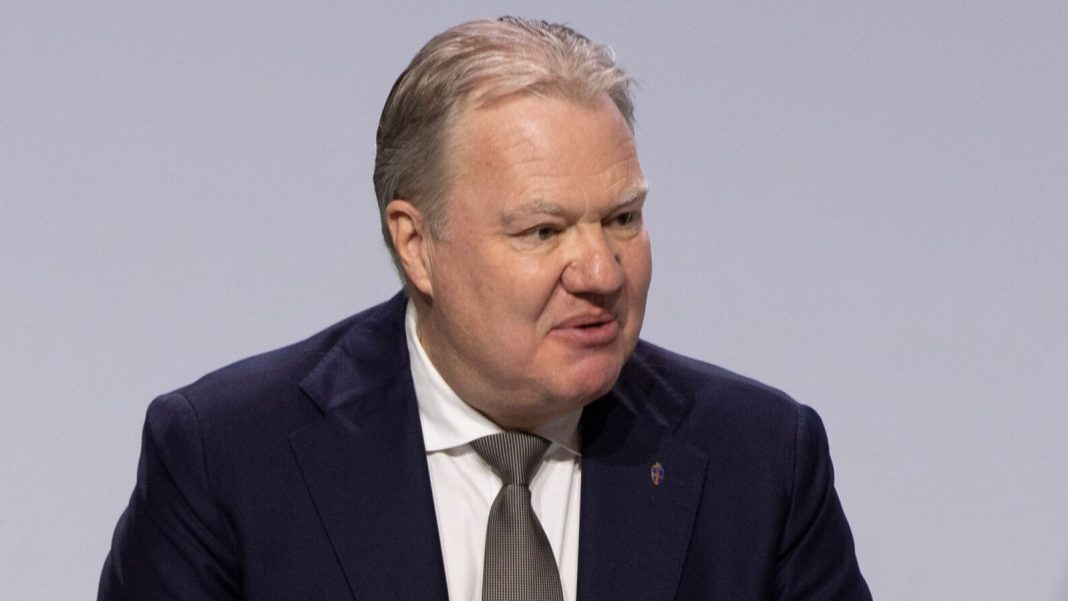For most members of European football’s top decision-making body it was a surprise move – a vote to end the blanket ban on Russia’s football teams competing in their competitions.
Once it was proposed by UEFA President Aleksander Čeferin, the first voice to speak up in Cyprus was his second in command, Sky News was told.
The expectation would have been for Karl-Erik Nilsson to oppose the motion given his role leading Swedish sports’ opposition to Russia participating in international events while the war in Ukraine continues.
But loyalty to UEFA it seems came first, with its first vice-president enthusiastically endorsing the readmission of Russia’s under-17s in time to qualify for the European Championships.
The vote, like the entire meeting, was held in private in Limassol.
But Sky News revealed the high-level voting, highlighting in a report about the opposition from British vice presidents to Russia’s footballing return how Mr Nilsson “unexpectedly” went against the Swedish stance.
The repercussions were widespread as Sky’s reporting on his inconsistencies was acted on in Sweden and beyond – and ultimately led to his resignation as chair of the Swedish Sports Confederation.
It followed a week of emergency meetings by Swedish sports chiefs.
Karl-Erik Nilsson (left in 2019 with Aleksander Ceferin) voted for the partial return of Russian teams
Nilsson attempts to deny Sky reports
Mr Nilsson initially attempted to deny Sky’s reporting on 29 September, announcing: “I do not recognise myself at all in the British media description,” while using UEFA secrecy requirements for not definitely disclosing the vote.
But three days later he issued a new statement admitting he had shown support for easing Russia’s ban, saying: “I am sorry that my position in UEFA, and the decision there, have been interpreted as that I do not … continue to stand for our common stance. I do.”
But that admission managed to misrepresent the vote as only approving “an investigation into the forms to open up for children from Russia to participate in competitions.”
UEFA had actually said the decision was more definitive than that, outlining the next steps being more technical on fitting Russia’s teams into U17s men’s and women’s qualifying groups that had already been drawn.
Mr Nilsson’s statement only increased the pressure on him with criticism coming from the Swedish government.
Social affairs minister Jakob Forssmed said: “The action appears to be remarkable.”
Read more from Sky News:
Hamas launches deadly attack on Israel
Nobel Peace Prize given to jailed Iranian activist
The concern was that nothing had changed in the war to prompt a U-turn by UEFA, which took the hard stance, days after the full-scale invasion was launched in February 2022, to ban Russia in a “full solidarity with all the people affected in Ukraine”.
That statement indicated the situation in Ukraine will need to “improve significantly” for Russia to be readmitted.
UEFA decision ‘significant’ in bringing Russia back into football
Russia’s senior teams remain banned from club competitions like the Champions League and from qualifying for the main European Championships with UEFA condemning the war while saying it no longer wants to punish children for the actions of adults.
But the UEFA decision – followed by Sky News revealing FIFA would also readmit Russia’s U17s – is a significant step in bringing the outcast nation back into the footballing fold.
UEFA privately believes it is just aligning with the Ukrainian sports ministry softening its stance in July – effectively ending the ban on athletes participating at most events where Russians were competing.
But the UEFA decision has placed an unusually large spotlight on youth championships that lack any notable television rights deals and receive little media attention.
Swedish backlash at UEFA made position untenable
Sweden’s concern about UEFA’s decision was so strong that the country’s football federation immediately announced it would block Russia’s participation in the women’s U17s European Championship finals it is hosting next year. Among at least 12 European nations refusing to play Russia are England.
And Mr Nilsson’s position became increasingly untenable.
On Friday he was forced out of the umbrella organisation that distributes about £150m of state funding to sport across Sweden.

Karl-Erik Nilsson
His resignation was tendered at a crisis meeting of the Swedish Sports Confederation after being unable to reconcile the differences in positions he took on Russia on two fronts in sports politics at home and at UEFA.
“It has proven difficult to combine my two roles and that it can affect trust in me and Swedish sports,” he said.
He went on to blame media scrutiny, saying: “The attention has triggered a lot of hatred and personal attacks.”
But the Swedish newspaper Expressen noted: “It wasn’t the media attention that made the situation untenable, but that he ultimately voted to normalise Putin’s war.”
Now his position as the highest-ranking UEFA vice president is in jeopardy – if he lacks the support of the Swedish football federation which he previously led for a decade.
And Mr Nilsson is yet to explain the inconsistencies in his statements after trying to keep his pro-Russia stance at UEFA secret until it was exposed and led to his downfall in Sweden.







